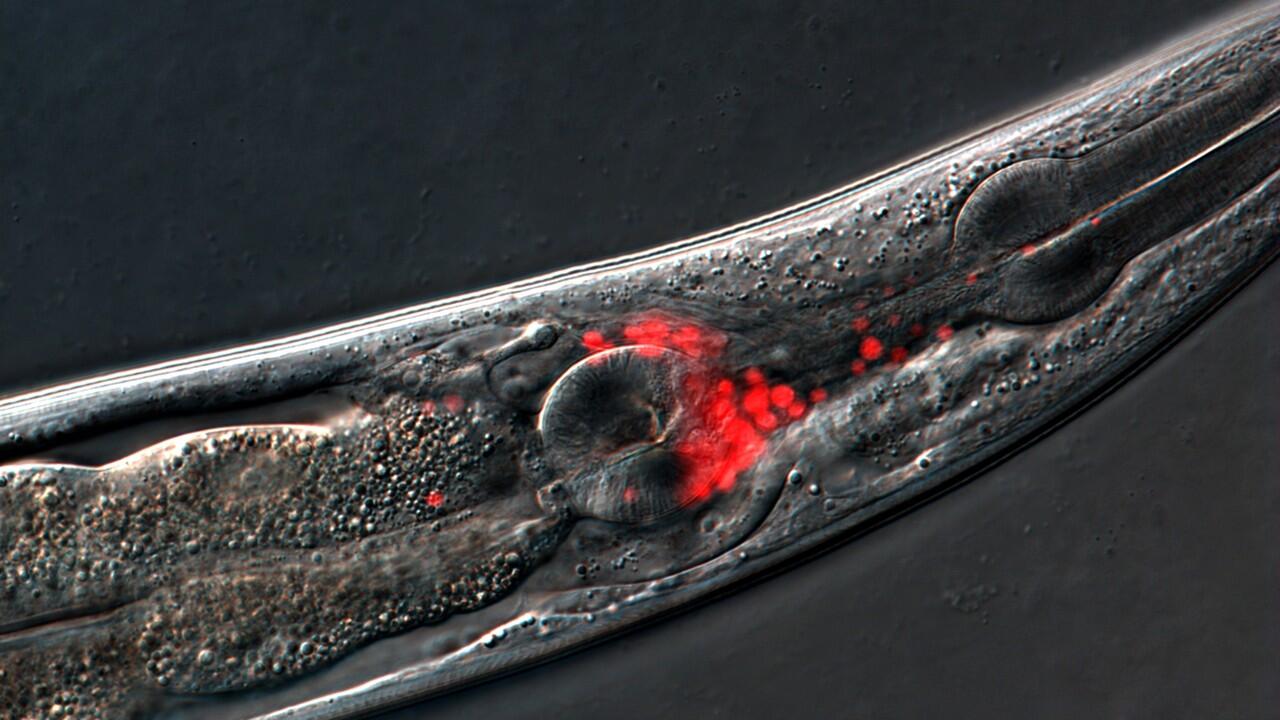
A group from Nagoya University in Japan has discovered that when the diet of nematodes, tiny worms measuring about a millimeter or less in length, includes the bacteria Lactobacillus reuteri, the weakening of associative learning ability caused by aging does not occur. These results may suggest ways to use diet to reduce age-related cognitive decline in other animals, including humans. Their findings were published in the journal eLife.
“This research is significant in that it established a method for studying the effects of diet on brain function in aging individuals using a combination of nematodes and bacteria as food,” said Associate Professor Kentaro Noma from the Graduate School of Science at Nagoya University. “Taking advantage of the characteristics of nematodes to measure both individual lifespan and aging of brain function, we found dietary conditions that maintain brain function, but not longevity. We usually think that the decline in brain function is caused by aging, but perhaps the processes of aging of brain function and individual lifespan are controlled by different mechanisms.”
Researchers are interested in how a person can use diet to maintain healthy brain activity. However, since the effects of diet are complex, they remain a difficult topic to study. To get around this problem, researchers study simpler organisms to understand the basic mechanisms behind these processes.
Such organisms include nematodes, tiny roundworms favored by researchers because of their simple anatomy, short lifespan, and ease of genetic manipulation. The research group used the nematode Caenorhabditis elegans, which has a short lifespan of only two weeks, but uses its simple nervous system to exhibit memory-learning behaviors.
Noma was especially interested in the behavior known as thermotaxis, which describes the movement of an organism toward a preferred temperature. “Nematodes seem to learn by associating the presence or absence of food with their rearing temperature,” Noma explained. When C. elegans is reared at a certain temperature with food and then placed on a temperature gradient without food, it will move toward the rearing temperature. However, if it is reared at the same temperature without food, it will not demonstrate thermotaxis toward the rearing temperature. “Therefore,” he continued, “we can use thermotaxis as an indicator of associative learning ability.”
To see whether changing diet influences learning, the researchers screened 35 different strains of lactic acid bacteria owned by Megmilk Snow Brand Co. They sought to identify possible diets that could maintain the associative learning ability of nematodes as they grew older. The researchers identified Lactobaillus reuteri, a probiotic that is studied for its potential health benefits, especially for the management of gastrointestinal disorders. This bacterium was found to be associated with the maintenance of the associative learning ability of the nematodes, while having no effect on their lifespan.
To understand how L. reuteri affects nematodes, the group identified a key protein, DAF-16 transcription factor, that regulates the functioning of neurons of nematodes fed L. reuteri. This was what they had hoped to find because the DAF-16 gene is involved in the regulation of the processes of aging and longevity.
“Since our intestines contain a myriad of bacteria, including E. coli and lactobacilli, the balance of these bacteria may also affect our brain function,” Noma said. “Furthermore, genes similar to those found in this study are also present in humans. This suggests that the mechanism that explained the effect of diet on changes in brain function with age may also exist in humans. With further research, it is possible that maintaining high brain function in old age through diet will become a reality.”
The study, “Bacterial diet affects the age-dependent decline of associative learning in Caenorhabditis elegans,” was published in the journal eLife on May 30, 2023 at https://elifesciences.org/articles/81418
Authors
Satoshi Higurashi, Sachio Tsukada, Binta Maria Aleogho, Joo Hyun Park, Yana Al-Hebri, Masaru Tanaka, Shunji Nakano, Ikue Mori, and Kentaro Noma
Media Contact
Matthew Coslett
- International Communications Office, Nagoya University
- kouho-en@adm.nagoya-u.ac.jp








